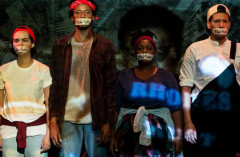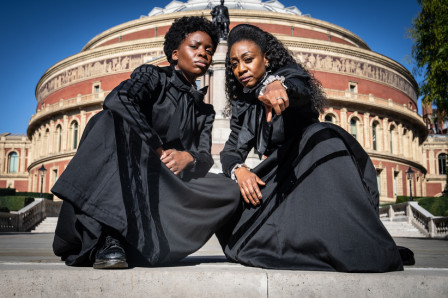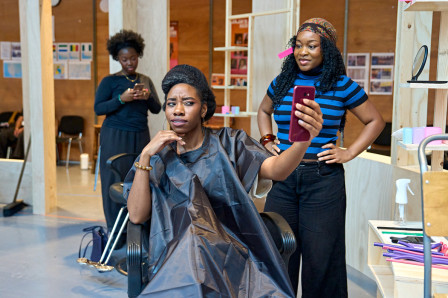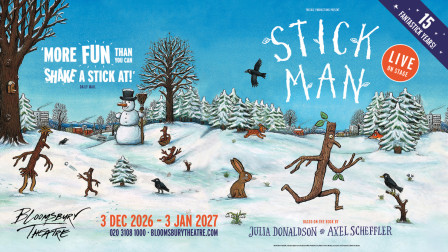Review: THE FALL at The Royal Court
 On paper The Fall sounds like worthy issue based theatre which you'd attend out of duty rather than look forward to.
On paper The Fall sounds like worthy issue based theatre which you'd attend out of duty rather than look forward to.
Actually it turns out to be a funny, tuneful, inspiring, thought provoking and deeply satisfying 80 minutes of great theatre.
It's a devised piece, created and performed by seven South African students. It was a big hit at the Edinburgh Festival this summer and it's easy to see why.
Simply staged and played with extraordinary and refreshing energy, talent and commitment by its young cast it centres around the campus riots and dissent at Cape Town University in 2015. Events culminated in the removal of a statue honouring Victorian imperialist, Cecil Rhodes, who was central to the British colonisation of South Africa and of the subjugation of its indigenous population which led to Apartheid.
As that odious system of segregation continued to crumble and students were craving recognition of their own heritage, rather than that of their oppressors, they demanded that the liberal management removed the statue. The process took too long, and its continuing existence became symbolic of the way young South Africans were being ill-served by the education system.
Such was the strength of feeling that protest groups of both reluctant and hardcore student agitators formed and took matters into their own hands, occupying the university’s administration and pulling down the monument themselves, watched by the world's media.
What raises this production above a dramatised Wikipedia entry of a landmark moment is the way it helps you understand the role of the individual within a political movement. We’re led to understand that the statue didn't fall through the actions of a faceless, homogeneous mob.
The actors create such warm, relatable characters, gathering to discuss the event and its aftermath, and display such a range of aptitudes, radicalism and perspectives, that it makes the unifying of political dissent, any political dissent, seem all the more wondrous.
Events are played out in classic “agit prop” style on a bare stage with just a few tables. On this occasion they’re beautifully lit but, in the style of political protest theatre down the ages, this “no frills” approach could be powerfully presented in a classroom, a factory canteen, a conference foyer, anywhere it might draw an enquiring audience.
“No frills” however doesn’t mean “no thrills”.
The evocative and harmonic South African song, performed live and acapella to underscore and punctuate the action, the precision of the expressionistic group movement and the detail and commitment in the individual performances is as good as anything you’ll see on a London stage tonight.
This is a short, dynamic piece of essential theatre which inspires with its story, its message and the quality of its acting. Highly recommended.
Latest News

 SYLVIA Releases First Single, 'March Women March'
4 March 2026 at 17:04
SYLVIA Releases First Single, 'March Women March'
4 March 2026 at 17:04

 Full cast and creative team announced for World Premiere of PLEASE PLEASE ME
4 March 2026 at 16:18
Full cast and creative team announced for World Premiere of PLEASE PLEASE ME
4 March 2026 at 16:18

 Rehearsal Images Released for JAJA'S AFRICAN HAIR BRAIDING at Lyric Hammersmith Theatre
4 March 2026 at 15:05
Rehearsal Images Released for JAJA'S AFRICAN HAIR BRAIDING at Lyric Hammersmith Theatre
4 March 2026 at 15:05

 STICK MAN returns to London for 15th run this festive season
4 March 2026 at 12:06
STICK MAN returns to London for 15th run this festive season
4 March 2026 at 12:06
